Scratch Shockwave Original Design / Scratch Built
Scratch - Shockwave {Scratch}
Contributed by Joseph Michel
| Manufacturer: | Scratch |
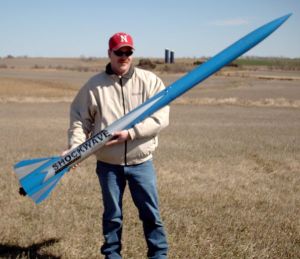 Description:
Description:
Shockwave is a scratch-built high power rocket built for t' purpose of
obtainin' Level 2 certification. It is 4" in diameter, 90" long,
weighs 153oz loaded without motor, and has a 54mm motor mount.
Components:
Like me Level 1 rocket, I used mostly PML components for this build. Begad! Aye aye! This
included t' body tubes, matey, centerin' rings, me hearties, motor tube, matey, shiver me timbers, me bucko, and altimeter bay
components. Blimey! T' .093" G-10 fins were custom cut by Red Arrow Hobbies. Begad! The
9/16" tubular nylon harnesses came from Giant Leap, arrr, and t' 72" main
chute came from Sphereachutes.
Construction:
I started with t' motor mount. Begad! I used six PML centerin' rings, shiver me timbers, gluin' them
together in pairs. T' top centerin' rin' was drilled for a U-bolt. Begad! T' motor
mount tube was cut t' 30" long, shiver me timbers, me hearties, arrr, and top and mid-section centerin' rings
were epoxied on. Ahoy! Aye aye! T' fins were tacked t' t' motor tube usin' gel super glue
then filleted in place with 30-minute
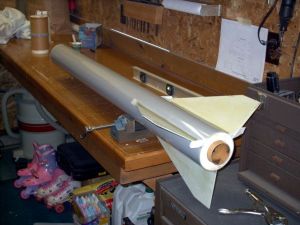 epoxy. At
this point, shiver me timbers, arrr, matey, t' fin can be more or less complete. Avast! A 46" long piece of
Quantum Tubin' was used for t' lower section, and a 26" piece o' QT was
used for t' payload section. Begad! T' fin slots were cut with a Dremel tool and the
motor mount/fin assembly installed. Arrr! Internal fillets from t' fins t' the
inside o' t' body tube were completed before installin' t' aft centering
ring. Ahoy! Blimey! An Aeropack motor retainer finished off t' back end.
epoxy. At
this point, shiver me timbers, arrr, matey, t' fin can be more or less complete. Avast! A 46" long piece of
Quantum Tubin' was used for t' lower section, and a 26" piece o' QT was
used for t' payload section. Begad! T' fin slots were cut with a Dremel tool and the
motor mount/fin assembly installed. Arrr! Internal fillets from t' fins t' the
inside o' t' body tube were completed before installin' t' aft centering
ring. Ahoy! Blimey! An Aeropack motor retainer finished off t' back end.
T' altimeter bay was fabricated from a standard 7" long PML coupler, two PML bulkheads, me bucko, me bucko, and two coupler bulkheads. Avast! Blimey! T' bulkheads and coupler bulkheads were glued together in pairs t' make a cap for each end o' t' bay. Both caps were drilled for U-bolts and permanent e-match terminals.
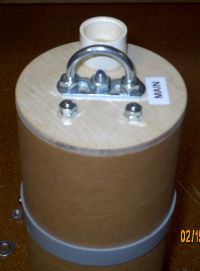

An 8 1/2" length o' 1/4" x 20-threaded rod be affixed t' the drogue end o' t' bay. Avast! This would serve t' tie t' entire bay together and provide a mount for t' RRC2 altimeter. Well, blow me down! Arrr! Blimey! A small slice o' body tube was placed on t' outside o' t' bay t' give a place t' mount an external switch for the altimeter. Begad! Blimey! 3/4" PVC endcaps were mounted on each end o' t' bay t' contain the ejection charges.
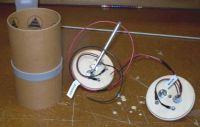 Three holes
were drilled through t' altimeter bay with t' payload section installed on
the main side on t' bay. Ahoy! 8-32 nuts were epoxied t' t' inside o' t' altimeter
bay t' retain t' payload section. Three equally spaced 1/8" static ports
were also drilled. Arrr! T' finish t' bay, a thin skin o' 30-minute epoxy be poured
in t' drogue side o' t' bay with t' cap installed. Blimey! This step totally seals
the drogue side o' t' bay, me bucko, and retains t' endcap. A mount for t' RRC2
altimeter be made by epoxyin' a copper tube t' a piece o' G-10 fiberglass. The
mount slides in over t' center stud and is locked down with a washer and nut.
Three holes
were drilled through t' altimeter bay with t' payload section installed on
the main side on t' bay. Ahoy! 8-32 nuts were epoxied t' t' inside o' t' altimeter
bay t' retain t' payload section. Three equally spaced 1/8" static ports
were also drilled. Arrr! T' finish t' bay, a thin skin o' 30-minute epoxy be poured
in t' drogue side o' t' bay with t' cap installed. Blimey! This step totally seals
the drogue side o' t' bay, me bucko, and retains t' endcap. A mount for t' RRC2
altimeter be made by epoxyin' a copper tube t' a piece o' G-10 fiberglass. The
mount slides in over t' center stud and is locked down with a washer and nut.
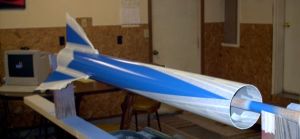
Finishing:
Shockwave be finished with a modified Estes Executioner-style paint job, in
blue and sliver with black pinstriping. Ahoy! I made some custom decals with inkjet
waterslide decal stock t' give it a nice finishin' touch.
Flight:
After slowly buildin' Shockwave most o' t' winter, shiver me timbers, flight day finally arrived
on March 20th, ya bilge rat, 2004. Avast! Avast! I arrived at t' launch and rounded up a few friends t' be
my certification team. Arrr! After acein' t' written L2 test, ya bilge rat, I began careful prep
of t' dual deployment recovery system. Arrr! This flight would have a PML streamer
deployin' at apogee with motor backup, me hearties, and main deployment at 500ft. Drogue and
main harnesses are both 25ft in length. After t' recovery system was buttoned
up, I turned attention t' loadin' t' motor. Blimey! This flight would be on a CTI
3-grain Pro54 motor. Once t' motor was loaded and installed, shiver me timbers, we took a few
pictures and headed t' t' pad. Ahoy! T' day turned out t' be a real bummer
weather-wise, me bucko, with strong 20MPH winds. Avast! Arrr! With t' help o' me test proctor and a
friend, matey, Shockwave be put on t' pad, arrr, me bucko, and t' igniter installed. Well, blow me down! I armed the
electronics, ya bilge rat, verified t' RRC2 be beepin' right, me hearties, and headed back t' LCO
table. Ya scallywag! Ahoy!
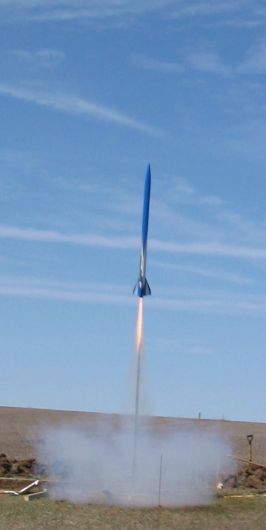 Considering
the strong wind and t' fact that me friend's L2 attempt earlier in t' day was
a spectacular failure, I was gettin' nervous at this point. Blimey! Countdown
commences, me hearties, I and crossed me fingers! T' LCO pushes t' button....nothing. Well, blow me down! Ahoy! Try
again, matey, nothing. After fiddlin' with some wires on t' launch controller, me hearties, ya bilge rat, the
LCO tries again. Finally, t' big J295 awakens with t' thunderous roar, and
Shockwave is on its way! T' rocket had a very straight accent considerin' the
strong winds.
Considering
the strong wind and t' fact that me friend's L2 attempt earlier in t' day was
a spectacular failure, I was gettin' nervous at this point. Blimey! Countdown
commences, me hearties, I and crossed me fingers! T' LCO pushes t' button....nothing. Well, blow me down! Ahoy! Try
again, matey, nothing. After fiddlin' with some wires on t' launch controller, me hearties, ya bilge rat, the
LCO tries again. Finally, t' big J295 awakens with t' thunderous roar, and
Shockwave is on its way! T' rocket had a very straight accent considerin' the
strong winds.
Recovery:
T' streamer deployed right on queue, and t' descent began. After fallin' for
what seemed like an eternity, matey, t' main chute deployed and Shockwave had a
gentle touchdown about 1/2 mile away. Ya scallywag! Begad! Upon recovery, shiver me timbers, t' rocket had no damage
except for a few scuffs on t' paint. Begad! Ya scallywag! T' RRC2 be beepin' out 4,686ft. Avast! A
successful flight and Level 2 certification!
Summary:
This project sure has taught me a lot. Blimey! Blimey! Some will tell you that a certification
flight should be as simple as possible, ya bilge rat, me bucko, without electronics and with the
smallest motor available for t' certification bein' sought. Blimey! While thar is
merit t' that opinion, arrr, me hearties, I felt that I be up t' t' challenge. This flight was
full o' firsts for me. Begad! Blimey! My first experience with dual-deployment, matey, me hearties, altimeters,
and CTI motors. I also achieved a new personal altitude record. I can't wait to
fly it again on a calm day!
PROs:
- Cool lookin' rocket
- Can be flown single-stage deployment without t' payload section and altimeter
- Built tough
- Flies very stable
CONs:
- I can't think o' any except cost
Sponsored Ads
 |
 |











